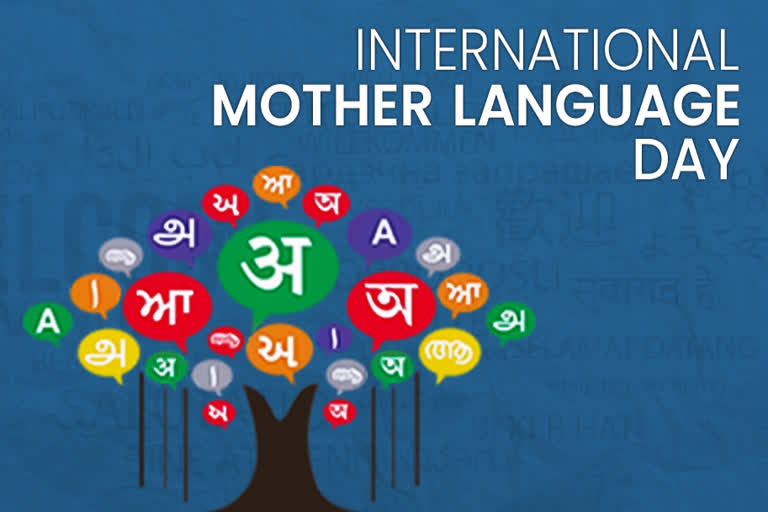Hyderabad: International Mother Language Day recognizes that languages and multilingualism can advance inclusion and sustainable development goals’ focus on leaving no one behind. UNESCO believes education, based on the first language or mother tongue, must begin from the early years as early childhood care and education is the foundation of learning.
On International Mother Language Day the UN's Educational, Scientific and Cultural Organization (UNESCO) and UN agencies participate in events that promote linguistic and cultural diversity. They also encourage people to maintain their knowledge of their mother language while learning and using more than one language. Governments and non-governmental organizations may use the day to announce policies to encourage language learning and support.
In Bangladesh, February 21 is the anniversary of a pivotal day in the country's history. People lay flowers at a Shaheed Minar (martyr's monument). They also purchase glass bangles for themselves or female relatives, eat a festive meal and organize parties and award prizes or host literary competitions. People celebrate Bangladesh’s culture and Bengali language.
The Linguapax Institute, in Barcelona, Spain, aims to preserve and promote linguistic diversity globally. The institute presents the Linguapax Prize on International Mother Language Day each year. The prize is for those who have made outstanding work in linguistic diversity or multilingual education.
READ: International Yoga Day: B'wood divas who swear by Yoga
2021 theme
The theme of the 2021 International Mother Language Day, “Fostering multilingualism for inclusion in education and society,” recognizes that languages and multilingualism can advance inclusion, and the Sustainable Development Goals’ focus on leaving no one behind. UNESCO believes education, based on the first language or mother tongue, must begin from the early years as early childhood care and education is the foundation of learning.This year’s observance is a call on policymakers, educators and teachers, parents and families to scale up their commitment to multilingual education, and inclusion in education to advance education recovery in the context of COVID-19. This effort also contributes to the United Nations International Decade of Indigenous Languages (2022-2032), for which UNESCO is the lead agency, and which places multilingualism at the heart of indigenous peoples’ development.
History
The day has its roots dating back to 1952 when students of Dhaka University in Bangladesh protested and organized rallies to re-instate Bangla, their mother tongue (which was spoken by a majority of people in Bangladesh) as their national language. After the partition of India and Pakistan, the Pakistani Government declared Urdu as the sole national of East Pakistan and West Pakistan both. The people of East Pakistan (now Bangladesh) fought and sacrificed their lives for their mother tongue. In 1956, the government granted official status to Bangla or Bengali. Although Bangladesh became independent in 1971, the country still observes the national holiday on 21st February and celebrates International Mother Language Day.
READ: Know all about International Day of Zero Tolerance for Female Genital Mutilation
Background
During the partition of India in 1947, the Bengal province was divided according to the predominant religions of the inhabitants. The western part became part of India and the eastern part became a province of Pakistan known as East Bengal and later East Pakistan. However, there was economic, cultural and lingual friction between East and West Pakistan.
The tensions were apparent in 1948 when Pakistan's government declared that Urdu was the sole national language. This sparked protests amongst the Bengali-speaking majority in East Pakistan. The government outlawed the protests but on February 21, 1952, students at the University of Dhaka and other activists organized a protest. Later that day, the police opened fire at the demonstrators and killed four students. These students' deaths in fighting for the right to use their mother language is now remembered on International Mother Language Day.
The unrest continued as Bengali speakers campaigned for the right to use their mother language. Bengali became an official language in Pakistan on February 29, 1956. Following the Bangladesh Liberation War in 1971, Bangladesh became an independent country with Bengali as its official language.
On November 17, 1999, UNESCO proclaimed February 21 to be International Mother Language Day and it was first observed on February 21, 2000. Each year the celebrations around International Mother Language Day concentrate on a particular theme.
READ: International Day of Older Person
Celebrations in India
All Central Board of Secondary Education (CBSE) schools are celebrating February 21 as ‘Matribhasha Diwas’ (Mother Language Day), Back in 1999, the United Nations Educational, Scientific and Cultural Organization (UNESCO) had declared February 21 as International Mother Language Day, and this was formally recognised in 2008 by the United Nations General Assembly (UNGA) as well.
The Ministry of Information and Broadcasting tweeted that ‘Celebrating Our Multilingual Heritage’ will be the theme for this year's Matribhasha Diwas’ celebrations, and the events held to mark the day will reflect the spirit of “Ek Bharat Shreshtha Bharat”



